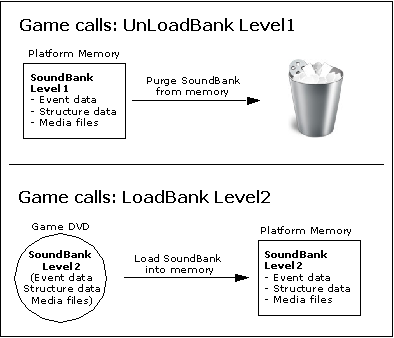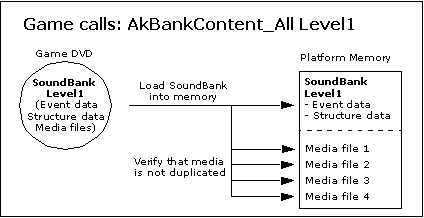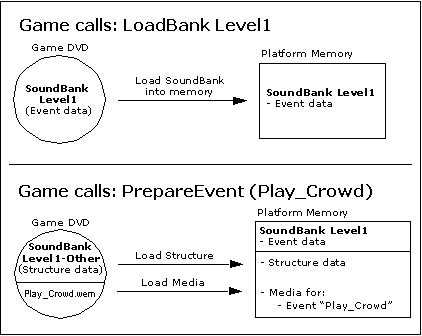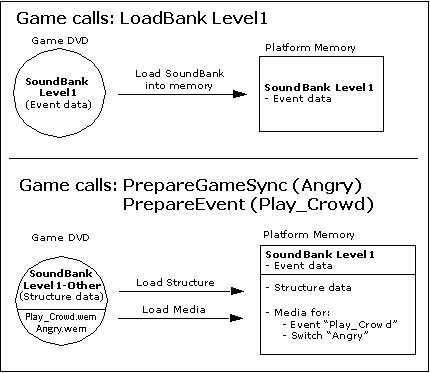Version
menu
Before learning how to create, populate, and generate SoundBanks in Wwise, it is important to understand the different ways that SoundBank information can be loaded and managed by your game. The optimal method depends on a number of different factors, including the type of game you are developing, the platforms on which it will run, and the constraints set by the project team itself.
In an attempt to be as flexible as possible and to meet the requirements of almost any type of game, Wwise offers several different methods for loading audio and motion in a game, including the following:
The traditional method of loading SoundBanks uses SoundBanks that contain a mix of Event data, object structure data, and media. The entire contents of these SoundBanks are loaded and unloaded at particular points in the game to ensure that Event data and related media are ready to be played when triggered.
The following illustration demonstrates how SoundBanks created using the traditional method are loaded and unloaded from platform memory as the player moves from Level 1 to the Level 2 in the game.
 |
Since all the data and media for a particular SoundBank are loaded into memory at the same time, this method not only ensures that all data and media are ready to play when required, but it performs very little disk seeking during gameplay, which frees up the disk for other disk intensive tasks.
The main drawback with this method is that a substantial amount of memory is taken for the entire time that the SoundBanks are loaded, which gives you less flexibility when dealing with large, sophisticated games. This method also explicitly loads all the content within a SoundBank without verifying to see if media files are already loaded into memory. This might cause the same media file to be loaded into memory more than once. Despite these drawbacks, the traditional method can still be useful in many situations. For example, in a typical pinball game, where all data and media must be available at all times.
To overcome some of the drawbacks of the LoadBank() mechanism, you can prepare your SoundBanks instead of loading them using AkBankContent_All(). When using this method, your SoundBanks might still include all content types (Events, structure data, and media files); but, instead of loading the media files outright, this method loads all media into memory by using the PrepareEvent() mechanism. By using this mechanism to load media, Wwise first checks to see if a media file already exists in memory before loading it. This keeps memory usage at a minimum by avoiding any duplication of media files in memory.
Along with memory savings, this method also guarantees that disk access is sequential. This avoids the random disk seeking that is likely to occur when Events are prepared one at a time using PrepareEvent().
The following illustration demonstrates how the "Prepare Bank (All Content)" mechanism loads metadata and content into your platform's memory.
 |
When loading a SoundBank with Vorbis-encoded or WEM Opus-encoded media, it is possible to decode these media files into uncompressed PCM files with the Preparation_LoadAndDecode preparation type. This results in a larger SoundBank, but your media will be immediately available without needing to decode when an Event calls them.
The PrepareEvent() method dynamically loads media when it is required. To use method, the Action Event metadata must be in a loaded SoundBank and the associated media files must be accessible in the file system. The corresponding structure metadata can be included in the same SoundBank as Events or placed in a separate SoundBank, either user-defined or auto-defined. It can therefore simplify Event and SoundBank management because you can prepare multiple Events without the need to remember which SoundBanks contain the necessary media: the Wwise sound engine automatically retrieves the required files, wherever they are.
This method ensures that after a PostEvent call, the Action Event audio is played immediately (on the same frame) because there is no need to load the media. However, it uses more memory than other methods because the media and metadata are loaded and remain in memory.
![[Note]](/images/2023.1.17_8841/?source=Help&id=note.png) | Note |
|---|---|
|
To use this method, call the LoadBank() method to load the SoundBank that contains the Action Event metadata and keeps it in memory. When PrepareEvent() is called, the sound engine then "prepares" the Action Events before the game calls PostEvent(). To prepare an Event, the sound engine loads all non-streaming, referenced media files from the file system and all referenced structure metadata from a SoundBank, if it is not already loaded. When the Action Event is no longer required, unload it with Preparation_Unload so the corresponding media files are purged from memory.
The following illustration shows how Events can be prepared in advance so that only required media files are loaded into memory.
 |
When the metadata (also referred to as structure data) is not stored in the same SoundBank as the Events, Wwise includes references to the corresponding content stored in other SoundBanks. Wwise can use either names or IDs to refer to other SoundBanks. To use the SoundBank name in the sound engine, you must select the Use SoundBank Names option on the SoundBanks tab of the Project Settings dialog. To use IDs, clear the option. For more information, see SoundBanks Tab.
Media that a SoundBank references must be stored as loose files on disk or be resolvable by the low-level IO (such as in a File Package).
This method uses memory efficiently but performs more disk seeking than other methods, which might not be appropriate in situations when many files are already being streamed from the disk. Also, if the game uses States and Switches, media files could be loaded into memory unnecessarily. For example, if there are different sounds for the different moods or energy levels of a crowd in your game, they are all loaded into memory even if only some of the Switch sounds are valid within a particular zone of the game. To avoid this problem, you can prepare specific States or Switches that only load the media files associated with the prepared States or Switches.
The following illustration shows how you can prepare Switches in advance to limit the amount of media that is loaded into memory at any particular point in the game.
 |
Although preparing Game Syncs in advance can optimize memory usage, be aware that it also reduces the speed at which media is loaded into memory. Read times are longer when the sound engine needs to search the disk to find the sounds that correspond to the prepared game syncs.
By dynamically loading only the required audio files, The second method provides flexibility to handle situations where you have either large zones or levels with many sounds, or limited amounts of memory available to store Event data, structure data, and media.
![[Note]](/images/2023.1.17_8841/?source=Help&id=note.png) | Note |
|---|---|
The LoadBank, AkBankContent_All, PrepareEvent, PrepareGameSyncs, and AkBankContent_StructureOnly functions are accessible through the Wwise API. For more information on loading SoundBanks and preparing Events and game syncs, see the Integrating Banks section of the Wwise SDK. |
For a detailed overview of the different methods you can use to manage your SoundBanks, see Strategies for managing SoundBanks.
Questions? Problems? Need more info? Contact us, and we can help!
Visit our Support pageRegister your project and we'll help you get started with no strings attached!
Get started with Wwise